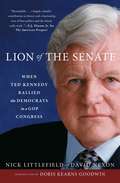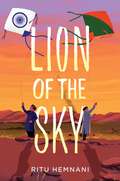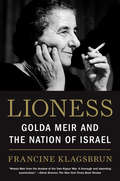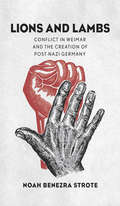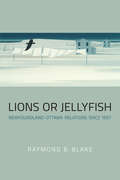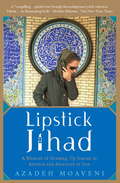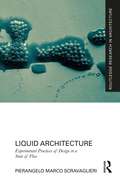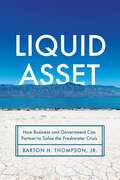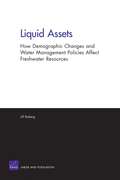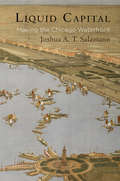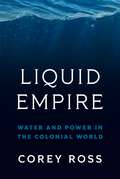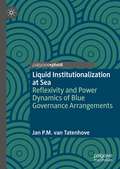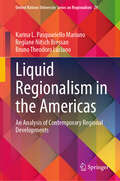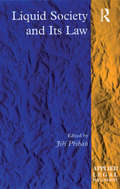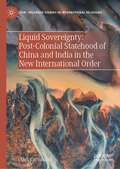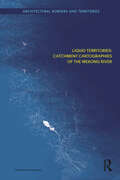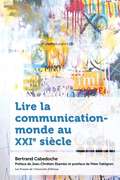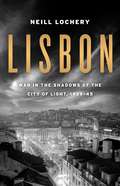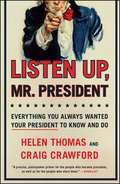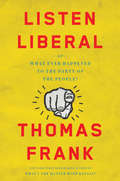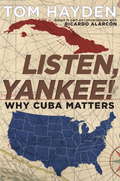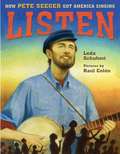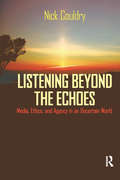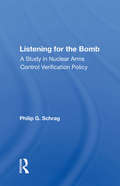- Table View
- List View
Lion of the Senate
by David Nexon Nick Littlefield"The best book I have read about the inner dynamics of the United States Senate." --Doris Kearns GoodwinTwo top domestic policy advisors to Senator Edward Kennedy offer an insider's view of several remarkable years when Kennedy fought to preserve the Democratic mission against Newt Gingrich's Contract with America and a Republican majority in both houses--a story that has special resonance now as a resurgent Republican right once again controls Congress. In November 1994 the election swept a new breed of Republicans into control of the United States Congress. Led by Speaker Newt Gingrich, the Republicans were determined to enact a conservative agenda that would reshape American government. Had it not been for Ted Kennedy, they would have succeeded. In 1994, after defending his Senate seat against challenger Mitt Romney, Kennedy came back to Washington to find Democrats, including President Clinton, demoralized and leaning toward "compromises" that would adopt much of the Republican agenda. Undaunted, Kennedy pressed the agenda he would have championed had his party held power. He rallied the Democrats. He reached across the aisle to craft and pass key progressive legislation. And he stopped the Gingrich revolution in its tracks. Nick Littlefield and David Nexon tell this story of a bare-knuckled and sometimes hilarious fight in the United States Senate. It is a political lesson for all time.
Lion of the Sky
by Ritu HemnaniAn evocative historical novel in verse about a boy and his family who are forced to flee their home and become refugees after the British Partition of India. Perfect for fans of Other Words for Home. Twelve-year-old Raj is happiest flying kites with his best friend, Iqbal. As their kites soar, Raj feels free, like his beloved India soon will be, and he can’t wait to celebrate their independence.But when a British lawyer draws a line across a map, splitting India in two, Raj is thrust into a fractured world. With Partition declared, Hindu, Sikh, and Muslim families are torn apart—and Raj’s Hindu and Iqbal’s Muslim families are among them.Forced to flee and become refugees, Raj’s family is left to start over in a new country. After suffering devastating losses, Raj must summon the courage to survive the brutal upheaval of both his country and his heart.Inspired by the author’s true family history, Lion of the Sky is a deeply moving coming-of-age tale about identity, belonging, and the power of hope.
Lioness: Golda Meir and the Nation of Israel
by Francine KlagsbrunThe definitive biography of the iron-willed leader, chain-smoking political operative, and tea-and-cake-serving grandmother who became the fourth prime minister of Israel Golda Meir was a world figure unlike any other. Born in tsarist Russia in 1898, she immigrated to America in 1906 and grew up in Milwaukee, where from her earliest years she displayed the political consciousness and organizational skills that would eventually catapult her into the inner circles of Israel's founding generation. Moving to mandatory Palestine in 1921 with her husband, the passionate socialist joined a kibbutz but soon left and was hired at a public works office by the man who would become the great love of her life. A series of public service jobs brought her to the attention of David Ben-Gurion, and her political career took off. Fund-raising in America in 1948, secretly meeting in Amman with King Abdullah right before Israel's declaration of independence, mobbed by thousands of Jews in a Moscow synagogue in 1948 as Israel's first representative to the USSR, serving as minister of labor and foreign minister in the 1950s and 1960s, Golda brought fiery oratory, plainspoken appeals, and shrewd deal-making to the cause to which she had dedicated her life—the welfare and security of the State of Israel and its inhabitants. As prime minister, Golda negotiated arms agreements with Richard Nixon and Henry Kissinger and had dozens of clandestine meetings with Jordan's King Hussein in the unsuccessful pursuit of a land-for-peace agreement with Israel's neighbors. But her time in office ended in tragedy, when Israel was caught off guard by Egypt and Syria's surprise attack on Yom Kippur in 1973. Analyzing newly available documents from Israeli government archives, Francine Klagsbrun looks into whether Golda could have prevented that war and whether in its darkest days she contemplated using nuclear force. Resigning in the war's aftermath, she spent her final years keeping a hand in national affairs and bemusedly enjoying international acclaim. Klagsbrun's superbly researched and masterly recounted story of Israel's founding mother gives us a Golda for the ages.
Lions and Lambs: Conflict in Weimar and the Creation of Post-Nazi Germany
by Noah Benezra StroteA bold new interpretation of Germany’s democratic transformation in the twentieth century, focusing on the generation that shaped the post-Nazi reconstruction Not long after the horrors of World War II and the Holocaust, Germans rebuilt their shattered country and emerged as one of the leading nations of the Western liberal world. In his debut work, Noah Strote analyzes this remarkable turnaround and challenges the widely held perception that the Western Allies—particularly the United States—were responsible for Germany’s transformation. Instead, Strote draws from never-before-seen material to show how common opposition to Adolf Hitler united the fractious groups that had once vied for supremacy under the Weimar Republic, Germany’s first democracy (1918-1933). His character-driven narrative follows ten Germans of rival worldviews who experienced the breakdown of Weimar society, lived under the Nazi dictatorship, and together assumed founding roles in the democratic reconstruction. While many have imagined postwar Germany as the product of foreign-led democratization, this study highlights the crucial role of indigenous ideas and institutions that stretched back decades before Hitler. Foregrounding the resolution of key conflicts that crippled the country’s first democracy, Strote presents a new model for understanding the origins of today’s Federal Republic.
Lions or Jellyfish
by Raymond B. BlakeAsked in 2010 about his pugnacious approach to federal-provincial relations, Newfoundland premier Danny Williams declared "I would rather live one more day as a lion than ten years a jellyfish." He was only the latest in a long line of Newfoundland premiers who have fought for that province's interests on the national stage. From Joey Smallwood and the conflict over Term 29 of the Act of Union to Williams and his much-publicized clashes with Paul Martin and Stephen Harper, Newfoundland and Labrador's politicians have often expressed a determination to move beyond a legacy of colonialism and assert greater control over the province's own affairs.Lions or Jellyfish? examines the history of these federal-provincial clashes with both clarity and wit. Written by a noted expert on Newfoundland politics and intergovernmental affairs in Canada, this book studies a vital but frequently overlooked aspect of modern Canadian federalism.
Lions under the Throne
by Stephen SedleyFrancis Bacon wrote in 1625 that judges must be lions, but lions under the throne. From that day to this, the tension within the state between parliamentary, judicial and executive power has remained unresolved. Lions under the Throne is the first systematic account of the origins and development of the great body of public law by which the state, both institutionally and in relation to the individual, is governed.
Lipstick Jihad: A Memoir of Growing up Iranian in America and American in Iran
by Azadeh MoaveniAs far back as she can remember, Azadeh Moaveni has felt at odds with her tangled identity as an Iranian-American. In suburban America, Azadeh lived in two worlds. At home, she was the daughter of the Iranian exile community, serving tea, clinging to tradition, and dreaming of Tehran. Outside, she was a California girl who practiced yoga and listened to Madonna. For years, she ignored the tense standoff between her two cultures. But college magnified the clash between Iran and America, and after graduating, she moved to Iran as a journalist. This is the story of her search for identity, between two cultures cleaved apart by a violent history. It is also the story of Iran, a restive land lost in the twilight of its revolution. Moaveni's homecoming falls in the heady days of the country's reform movement, when young people demonstrated in the streets and shouted for the Islamic regime to end. In these tumultuous times, she struggles to build a life in a dark country, wholly unlike the luminous, saffron and turquoise-tinted Iran of her imagination. As she leads us through the drug-soaked, underground parties of Tehran, into the hedonistic lives of young people desperate for change, Moaveni paints a rare portrait of Iran's rebellious next generation. The landscape of her Tehran -- ski slopes, fashion shows, malls and cafes -- is populated by a cast of young people whose exuberance and despair brings the modern reality of Iran to vivid life.
Liquid Architecture: Experimental Practices of Design in a State of Flux (Routledge Research in Architecture)
by Pierangelo Marco ScravaglieriLiquid Architecture challenges the idea of architecture as a fixed, inert container and reconceptualises it as a body whose boundaries are rather blurred and ever-changing. This book moves away from form as the primary driver of spatial protocols and explores what the built environment might look like when viewed through the lenses of a ‘wet ontology’ that is attentive to fluidity, flows and territorial dynamism. A reconfiguration of architectural materials and authorship is thus considered, leading, in turn, to an exploration of the ethical dimensions of co-designing with natural systems (of various viscosities) through liquid paradigms. The book examines a set of principles for practice-led discoveries that incorporate hybrid, mixed media with the author’s intersubjective relationship with liquid matter. Drawing from qualitative-based analytical investigation models, the text allows comprehension of the liquid phenomena via material contextualisation of an ever-becoming research setting. Through a practical and theoretical engagement with the ontology of liquids, the reader is exposed to a range of design-led experiments and creative propositions, visualisation systems, construction, and testing of physical models that collectively translate into a series of novel insights for architectural agendas. This book will be of interest to architecture and design research students and academics because it advocates the need for a more symbiotic and resilient approach to natural systems, which could benefit from the integration of regenerating material flows into our buildings and urban settlements.
Liquid Asset: How Business and Government Can Partner to Solve the Freshwater Crisis
by Barton H. Thompson Jr.A sweeping, policy-oriented account of the private and public management of the world's essential natural resource. Governments dominated water management throughout the twentieth century. Tasked with ensuring a public supply of clean, safe, reliable, and affordable water, governmental agencies controlled water administration in most of the world. They built the dams, reservoirs, and aqueducts that store water when available and move that water to areas with increasing populations and economies. Private businesses sometimes played a part in managing water, but typically in a supporting position as consultants or contractors. Today, given the global need for innovative new technologies, institutions, and financing to solve the freshwater crisis, private businesses and markets are playing a rapidly expanding role, bringing both new approaches and new challenges to a historically public field. In Liquid Asset, Barton H. Thompson, Jr. examines the growing position of the private sector in the "business of water." Thompson seeks to understand the private sector's involvement in meeting the water needs of both humans and the environment, looks at the potential risks that growing private involvement poses to the public interest in water, and considers the obstacles that private organizations face in trying to participate in a traditionally governmental sector. Thompson provides a richly detailed analysis to foster both improved public policy and responsible business behavior. As the book demonstrates, the story of private businesses and water offers a window into the serious challenges facing freshwater today, and their potential solutions.
Liquid Assets
by Jill BobergMost writings linking demographic trends to water availability often look only at population-growth effects, treating water supplies as static and population as increasing, inexorably leading to a water-availability crisis. This report's more holistic view of the interaction between demographics and water resources considers more demographic and local water-availability variables. It focuses on conditions in developing countries, where these factors intersect with the fewest socioeconomic resources to mediate.
Liquid Capital: Making the Chicago Waterfront (American Business, Politics, and Society)
by Joshua A. SalzmannIn the nineteenth century, politicians transformed a disease-infested bog on the southwestern shore of Lake Michigan into an intensively managed waterscape supporting the life and economy of Chicago, now America's third-most populous city. In Liquid Capital, Joshua A. T. Salzmann shows how, through a combination of entrepreneurship, civic spirit, and bareknuckle politics, the Chicago waterfront became a hub of economic and cultural activity while also the site of many of the nation's precendent-setting decisions about public land use and environmental protection. Through the political saga of waterfront development, Salzmann illuminates Chicago's seemingly paradoxical position as both a paragon of buccaneering capitalism and assertive state power.The list of actions undertaken by local politicians and boosters to facilitate the waterfront's success is long: officials reversed a river, built a canal to fuse the Great Lakes and Mississippi River watersheds, decorated the lakeshore with parks and monuments, and enacted regulations governing the use of air, land, and water. With these feats of engineering and statecraft, they created a waterscape conducive to commodity exchange, leisure tourism, and class harmony—in sum, an invaluable resource for profit making. Their actions made the city's growth and the development of its western hinterlands possible. Liquid Capital sheds light on these precedent-making policies, their effect on Chicago's development as a major economic and cultural force, and the ways in which they continue to shape legislation regarding the use of air and water.
Liquid Empire: Water and Power in the Colonial World
by Corey RossA bold new account of European imperialism told through the history of waterIn the nineteenth and twentieth centuries, a handful of powerful European states controlled more than a third of the land surface of the planet. These sprawling empires encompassed not only rainforests, deserts, and savannahs but also some of the world&’s most magnificent rivers, lakes, marshes, and seas. Liquid Empire tells the story of how the waters of the colonial world shaped the history of imperialism, and how this imperial past still haunts us today.Spanning the major European empires of the period, Corey Ross describes how new ideas, technologies, and institutions transformed human engagements with water and how the natural world was reshaped in the process. Water was a realm of imperial power whose control and distribution were closely bound up with colonial hierarchies and inequalities—but this vital natural resource could never be fully tamed. Ross vividly portrays the efforts of officials, engineers, fisherfolk, and farmers to exploit water, and highlights its crucial role in the making and unmaking of the colonial order.Revealing how the legacies of empire have persisted long after colonialism ebbed away, Liquid Empire provides needed historical perspective on the crises engulfing the world&’s waters, particularly in the Global South, where billions of people are faced with mounting water shortages, rising flood risks, and the relentless depletion of sea life.
Liquid Institutionalization at Sea: Reflexivity and Power Dynamics of Blue Governance Arrangements
by Jan P.M. van TatenhoveThis book presents an innovative theory of liquid institutionalization at sea and explores the building blocks of this theory focusing in particular on institutionalization, blue governance arrangements, reflexivity and power. The book opens with an overview of stability and change in new institutional theory before moving on to discuss liquid institutionalization in more detail. The author applies this approach to three different cases: Arctic shipping; deep seabed mining; and transboundary regionalization in Europe. For each of these cases the book describes the emerging blue governance arrangements, the type of liquid institutionalization and the consequences this has for power and reflexivity.
Liquid Regionalism in the Americas: An Analysis of Contemporary Regional Developments (United Nations University Series on Regionalism #29)
by Karina L. Pasquariello Mariano Regiane Nitsch Bressan Bruno Theodoro LucianoThis book develops a comprehensive analysis of contemporary regionalism in the Americas, which the authors characterise as Liquid Regionalism, given its unstable, flexible and loose characteristics. It innovates by introducing a new concept to assess regional initiatives in the American continents, contributing to Latin American and comparative regionalism research agendas. The book analyses major regional projects in the Americas and develops these into a novel typology of consultation, cooperation and integration. This typology helps explain the level of commitments and institutional depth of regional initiatives across the continent. The book is for scholars, postgraduate and undergraduate students interested in the regional and political dynamics of the Americas across the social sciences, including international relations, political science, sociology, international political economy, international trade, and history.
Liquid Society and Its Law (Applied Legal Philosophy)
by Jiří PřibáňThis collection of essays brings together Zygmunt Bauman and a number of internationally distinguished legal scholars who examine the influence of Bauman's recent works on social theory of law and socio-legal studies. Contributors focus on the concept of 'liquid society' and its adoption by legal scholars. The volume opens with Bauman's analysis of fears and policing in 'liquid society' and continues by examining the social and legal theoretical context and implications of Bauman's theory.
Liquid Sovereignty: Post-Colonial Statehood of China and India in the New International Order (Palgrave Studies in International Relations)
by Aleš KarmazinThis book project studies the variation of sovereignty in international order by analysing how the general model of sovereignty is localised in the political practice of two major non-Western rising powers, namely China and India. It aims to investigate how the sovereignty of these states is constituted, which includes the question of how sovereignty works and becomes constituted in specific contexts and cases that fall outside the discourses and positions of the so-called Westphalian (conservative, absolutist) sovereignty that is dominantly advocated by these two states on a global level. The core of this project explores specific contested cases and situates them vis-à-vis the broader approaches of China and India to sovereignty. I specifically analyse four particular cases: China’s approach to sovereignty in relation to Hong Kong and Taiwan and India’s approach to sovereignty in relation to Bhutan and Kashmir. In doing so, I will illustrate that sovereignty is a flexible and plastic phenomenon which can be intertwined with principles, models or practices that are usually seen as divergent from or contradicting sovereignty; for example, those that derive from China’s and India’s imperial and colonial history.
Liquid Territories: Catchment Cartographies of the Mekong River (Architectural Borders and Territories)
by Christoforos RomanosIn addition to being a fundamental concept for planning the water infrastructure which supports extensive agricultural economies across Southeast Asia, knowledge of the Mekong River’s hydrological catchments has calibrated the control of land, resources and people. Liquid Territories shows how and why the areal dimensions of the Mekong’s basin, delta and floodplain have become a critical geographic reference for human activities.This book concentrates on the way knowledge of the river’s catchments has been recorded on, and extracted from, maps. Repeatedly drawn by geographers, engineers and cartographers since before the start of European colonization, the book describes how cartographic projections of the basin, delta and floodplain have affected geopolitical strategy, the exercise of military power and anthropogenic modifications of the terrain. Drawing on the discourses of hydrology, geography and cartography, as well as military science, colonial politics and regional planning, the book explains why the spatial articulation of surface water flows is reflected in the configuration of national boundaries, soils and settlements today. Focusing on geographic concepts, the book provides insights into the process of urbanization in Southeast Asia, the region’s colonial and post-colonial history, the Mekong River’s political ecology, the scales of contemporary water management and the design of territory.This book will be relevant to academics who are interested specifically in the Mekong River and Lower Mekong Basin as well as in integrated water management planning. It would be especially relevant to architects, urbanists and landscape architects.
Lire la communication-monde au XXIe siècle (Hors collection)
by Professeur Bertrand CabedocheHallowed in course titles and leveraged in the nomenclature of international organizations, yet unfit to bring any clarification or synthesis that actually provides structure, the objectifying expression communication internationale has no scientific value, except as a research object. Yet, the expression bears meanings that must urgently be put into perspective, since it lends itself to discursive construct which often varies greatly according to the crossed—and often masked—interests of an ever-increasing number of actors on a global scale and based on the political-cultural fields where these tactical productions are disseminated. The first option for an enlightening approach is through the thread of an academically recognized discipline. More specifically, the introduction of information-communication science in France in 1978 opens up a corpus of theoretical approaches and epistemological questionings that are already meaningful, although they are limited to a single country. Taking notice of the multiple and sometimes competing scientific productions and collaborations that extend this time to whole continents, the crossed questioning reveals epistemological, theoretical, conceptual, and methodological inflections that support a provisional state of the research. Then, the concept of communication-monde, sketched by Armand Mattelart and elevated to the rank of structuring concept in the book, enables us to read the global stakes of communication as we step into the third millennium and acts as a decentring force against the permanent risks of ethnocentric thinking.
Lisbon: War in the Shadows of the City of Light, 1939-45
by Neill LocheryLisbon had a pivotal role in the history of World War II, though not a gun was fired there. The only European city in which both the Allies and the Axis power operated openly, it was temporary home to much of EuropeOCOs exiled royalty, over one million refugees seeking passage to the U. S. , and a host of spies, secret police, captains of industry, bankers, prominent Jews, writers and artists, escaped POWs, and black marketeers. An operations officer writing in 1944 described the daily scene at LisbonOCOs airport as being like the movie ?Casablanca, OCO times twenty. In this riveting narrative, renowned historian Neill Lochery draws on his relationships with high-level Portuguese contacts, access to records recently uncovered from Portuguese secret police and banking archives, and other unpublished documents to offer a revelatory portrait of the WarOCOs back stage. And he tells the story of how Portugal, a relatively poor European country trying frantically to remain neutral amidst extraordinary pressures, survived the war not only physically intact but significantly wealthier. The countryOCOs emergence as a prosperous European Union nation would be financed in part, it turns out, by a cache of Nazi gold.
Listen Up, Mr. President: Everything You Always Wanted Your President to Know and Do
by Helen Thomas Craig CrawfordHelen Thomas has covered the administrations of ten presidents in a career spanning nearly sixty years. She is known for her famous press conference closing line, "Thank you, Mr. President," but here she trades deference for directness. Thomas and veteran journalist Craig Crawford hold nothing back as they use former occupants of the White House to provide a witty, history-rich lesson plan of what it takes to be a good president. Combining sharp observation and dozens of examples from the fi rst presidency through the forty-fourth, the authors outline the qualities, attitudes, and political and personal choices that make for the most successful leaders, and the least. Calvin Coolidge, who hired the fi rst professional speechwriter in the White House, illuminates the importance of choosing words wisely. William Howard Taft, notorious for being so fat he broke his White House bathtub, shows how not to cultivate a strong public image. John F. Kennedy, who could handle the press corps and their questions with aplomb, shows how to establish a rapport with the press and open oneself up to the public. Ronald Reagan, who acknowledged the Iran-Contra affair in a television address, demonstrates how telling hard truths can earn forgiveness and even public trust. By gleaning lessons from past leaders, Thomas and Crawford not only highlight those that future presidents should follow but also pinpoint what Americans should look for and expect in their president. Part history lesson, part presidential primer,Listen Up, Mr. Presidentis smart, entertaining, and exceedingly edifying.
Listen, Liberal: Or, What Ever Happened to the Party of the People?
by Thomas FrankFrom the bestselling author of What's the Matter With Kansas, a scathing look at the standard-bearers of liberal politics -- a book that asks: what's the matter with Democrats?It is a widespread belief among liberals that if only Democrats can continue to dominate national elections, if only those awful Republicans are beaten into submission, the country will be on the right course. But this is to fundamentally misunderstand the modern Democratic Party. Drawing on years of research and first-hand reporting, Frank points out that the Democrats have done little to advance traditional liberal goals: expanding opportunity, fighting for social justice, and ensuring that workers get a fair deal. Indeed, they have scarcely dented the free-market consensus at all. This is not for lack of opportunity: Democrats have occupied the White House for sixteen of the last twenty-four years, and yet the decline of the middle class has only accelerated. Wall Street gets its bailouts, wages keep falling, and the free-trade deals keep coming. With his trademark sardonic wit and lacerating logic, Frank's Listen, Liberal lays bare the essence of the Democratic Party's philosophy and how it has changed over the years. A form of corporate and cultural elitism has largely eclipsed the party's old working-class commitment, he finds. For certain favored groups, this has meant prosperity. But for the nation as a whole, it is a one-way ticket into the abyss of inequality. In this critical election year, Frank recalls the Democrats to their historic goals-the only way to reverse the ever-deepening rift between the rich and the poor in America.
Listen, Yankee!
by Tom HaydenBased on unprecedented access to both Cuban and American officials, a book that offers fresh insight into one of history's most enigmatic relationships between nation-states--from one of America's best-known voices of political and social activism.Listen, Yankee! offers an account of Cuban politics from Tom Hayden's unique position as an observer of Cuba and as a US revolutionary student leader whose efforts to mobilize political change in the US mirrored the radical transformation simultaneously going on in Cuba.Chapters are devoted to the writings of Che Guevara, Régis Debray, and C. Wright Mills; the Cuban missile crisis; the Weather Underground; the assassination of JFK; the strong historical links between Cuba and Africa; the Carter era; the Clinton era; the Cuban Five; Elián González; and the December 17, 2014 declaration of normalization by presidents Obama and Castro.Hayden puts the present moment into historical context, and shows how we're finally finding common ground to the advantage of Cubans and Americans alike. From the Hardcover edition.
Listen: How Pete Seeger Got America Singing
by Leda SchubertListen.There was nobody like Pete Seeger.Wherever he went, he got people singing. With his head thrown backand his Adam’s apple bouncing,picking his long-necked banjoor strumming his twelve-string guitar,Pete sang old songs,new songs,new words to old songs,and songs he made up.In this gorgeously written and illustrated tribute to legendary musician and activist Pete Seeger, author Leda Schubert highlights major musical events in Mr. Seeger's life as well important moments of his fight against social injustice. From singing sold-out concerts to courageously standing against the McCarthy-era finger-pointing, Pete Seeger's life is celebrated in this bold book for young readers with gorgeous illustrations by Raúl Colón.A Neal Porter BookThis title has Common Core connections.
Listening Beyond the Echoes: Media, Ethics, and Agency in an Uncertain World
by Nick CouldryIn this book Nick Couldry, media and cultural theorist from the London School of Economics, asks what are the priorities for media and cultural research today - at a time of the intensified mediation of all fields of social life, threats to democratic legitimacy, and serious instability on the global political stage. The book calls for a "decentered" media research that rejects easy assumptions about media's role in holding societies together and instead looks more critically at the difference media make on the ground to the material conditions of our lives. In what detailed ways do media transform knowledge and agency in daily life? How do media contribute to the culture of democratic politics? And, most difficult of all, how can we live, ethically, with and through media? Couldry's previous work is well known for its breadth, ranging across media sociology, media theory and cultural theory. Here he draws also on political theory and ethics to develop a tightly-argued account of how media and cultural research must now reorient itself if it is to remain relevant and critical. Nick Couldry is Reader in Media, Communications and Culture at the London School of Economics and Political Science. He is the author or editor of five books including Media Rituals: A Critical Approach (Routledge 2003), The Place of Media Power (Routledge 2000) and (coedited with James Curran) Contesting Media Power (Rowman and Littlefield 2003).
Listening For The Bomb: A Study In Nuclear Arms Control Verification Policy
by Philip G. SchragGraham Allison's book Essence of Decision changed the way in which academic analysts think about how governments make major foreign and defense policy decisions.1 Before Allison's book appeared in 1971, even the leading writers on foreign policy tended to describe and explain governmental decisions almost exclusively as if governments were rational human beings making carefully considered choices among available options. This book applies the Allisonian framework to the response of the United States government to a private arms control initiative undertaken in 1986 by the Natural Resources Defense Council, an environmental organization.
